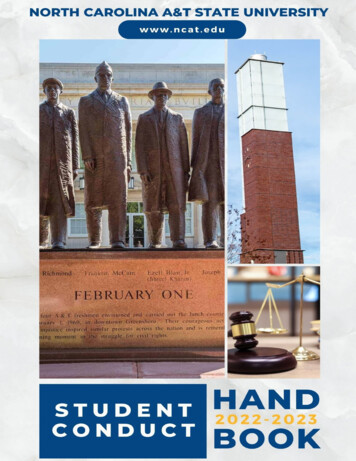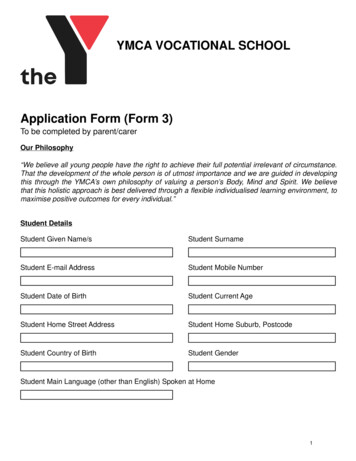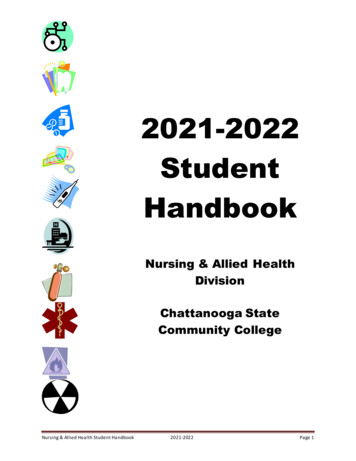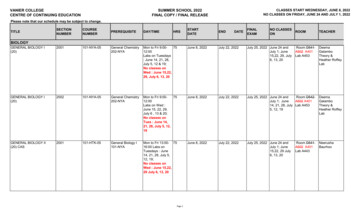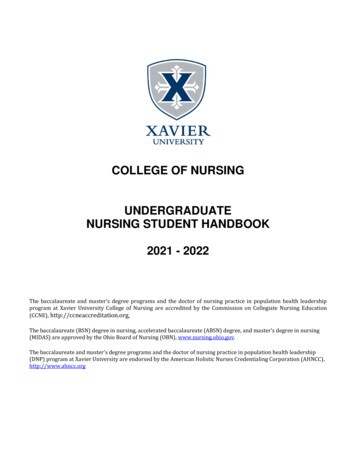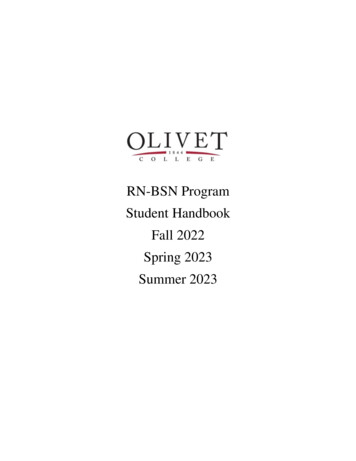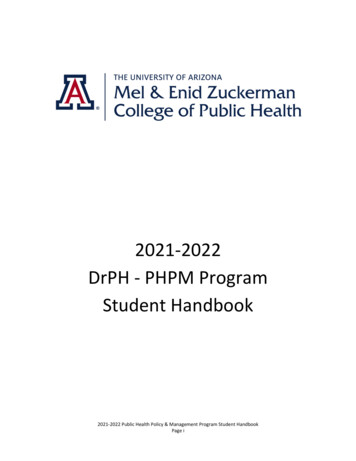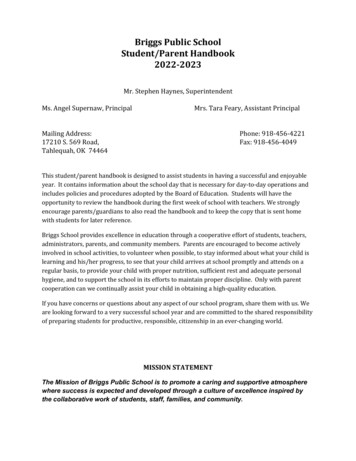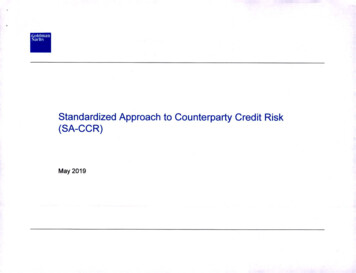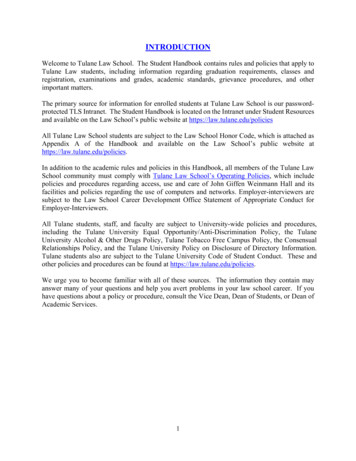
Transcription
INTRODUCTIONWelcome to Tulane Law School. The Student Handbook contains rules and policies that apply toTulane Law students, including information regarding graduation requirements, classes andregistration, examinations and grades, academic standards, grievance procedures, and otherimportant matters.The primary source for information for enrolled students at Tulane Law School is our passwordprotected TLS Intranet. The Student Handbook is located on the Intranet under Student Resourcesand available on the Law School’s public website at https://law.tulane.edu/policiesAll Tulane Law School students are subject to the Law School Honor Code, which is attached asAppendix A of the Handbook and available on the Law School’s public website athttps://law.tulane.edu/policies.In addition to the academic rules and policies in this Handbook, all members of the Tulane LawSchool community must comply with Tulane Law School’s Operating Policies, which includepolicies and procedures regarding access, use and care of John Giffen Weinmann Hall and itsfacilities and policies regarding the use of computers and networks. Employer-interviewers aresubject to the Law School Career Development Office Statement of Appropriate Conduct forEmployer-Interviewers.All Tulane students, staff, and faculty are subject to University-wide policies and procedures,including the Tulane University Equal Opportunity/Anti-Discrimination Policy, the TulaneUniversity Alcohol & Other Drugs Policy, Tulane Tobacco Free Campus Policy, the ConsensualRelationships Policy, and the Tulane University Policy on Disclosure of Directory Information.Tulane students also are subject to the Tulane University Code of Student Conduct. These andother policies and procedures can be found at https://law.tulane.edu/policies.We urge you to become familiar with all of these sources. The information they contain mayanswer many of your questions and help you avert problems in your law school career. If youhave questions about a policy or procedure, consult the Vice Dean, Dean of Students, or Dean ofAcademic Services.1
Rules, Policies and ProceduresI.ADMINISTRATION .5II.CLASSES AND REGISTRATION .5A.Course Load and Enrollment Status .5B.Joint Degree Programs .6C.Summer School and Summer Externships.6D.Certificate of Concentration Programs .7E.Class Size Limitations.8F.Multiple Sections of Courses .8G.Prerequisites .8H.Course Conflicts.8I.Course Books and Photocopied Class Materials .9J.Records and Transcripts.9K.Registration .9L.Adding and Dropping Courses.9M.Directed Research .10N.Auditing Classes .11O.Leave of Absence/Withdrawal .12P.Course Work in Other Departments Not Associated With Joint DegreeProgram Requirements.13Q.Student Evaluations of Faculty .13R.Employment While a Full-time Law Student .13S.Non-law Students Taking Law School Courses .14T.Services for Students with Disabilities .14U.Use of Personal Electronic Resources in Classrooms.14III.EXAMINATIONS.15A.Procedures .151.Anonymity .152.Services for Students with Disabilities .153.Exam Numbers.164.Exam Protocol.165.Exam Practices for International Graduate and InternationalExchange Students Only .176.Rescheduling Exam Times .17B.Absences from Examinations; Excuses; Rescheduling .18IV.GRADES .19A.Grading Scales .19B.Required Mean GPA .20C.D and/or F grades: Incomplete Grades .20D.Basis of Grades .21E.Penalties for Lack of Class Attendance or Preparation .222
F.G.H.I.J.K.L.M.N.O.Penalties Relating to Papers .24Deadlines for Submitting Grades .24Retention and Student Access to Examination Answers .24Appeal of Grades .24Pass/D/Fail Grading Option .26Effect of Grade of “F”; Retaking Course .27Notification of Grades; Transcripts .27Class Rank .28Grades in First Year Legal Research and Writing .28Journal Credit .29V.ACADEMIC STANDARDS.30A.Basis for Dismissal Because of an Unsatisfactory Academic Record .30B.Readmission .31C.Double Credit .32D.Eligibility for Degrees.321.General Degree Requirements for the JD Program .322.Upper-Class Writing Requirement .333.Experiential Learning Requirement .344.Pro Bono Requirement.345.General Degree Requirements for the Master’s Program .366.Degree Requirements for the SJD Program .37E.Academic Honors.39F.Limitation on Non-Classroom Credits .39G.Determination of Credit Hours Awarded for Coursework .40H.Experiential Courses .40VI.FINANCIAL OBLIGATIONS .41VII.CREDITS ACCUMULATED AWAY FROM TULANE .41A.Generally .41B.Coursework .41C.Externships.41D.Summer Unpaid Internships: Directed Research or Pro bono .42E.Students Visiting Away .43F.Semester Abroad Programs.43VIII. GRIEVANCE PROCEDURES FOR ALLEGED DISCRIMINATION .44IX.CAREER DEVELOPMENT OFFICE INTERVIEW POLICIES ANDPROCEDURES .44X.FAMILY EDUCATIONAL RIGHTS AND PRIVACY ACT .44XI.OTHER MATTERS .45APPENDIX A: LAW SCHOOL HONOR CODE3
APPENDIX B: ACADEMIC CALENDAR4
I.ADMINISTRATIONDeanVice Dean for Academic AffairsAssociate Dean for Faculty ResearchAssociate Dean for Experiential Learningand Public Interest ProgramsFaculty Chair of ClinicsAssistant Dean of StudentsAssistant Dean for AdmissionAssistant Dean of Academic ServicesAssistant Dean for Career DevelopmentAssistant Dean of Compliance &Senior Director of Career DevelopmentAssistant Dean for Financeand AdministrationAssistant Dean for Information Technologyand Media ServicesLaw Library DirectorExecutive Director for InternationalLegal ProgramsII.David D. Meyer, JDSally Brown Richardson, JDAnn M. Lipton, JDTonya Rhodes Jupiter, JDKatherine Maris Mattes, JDAbigail Gaunt, JDDavid T. Weinberg, JDDel Kirkpatrick, BS, MSSarka Cerna-Fagan, JD, MCJTim Peterson, BA, MBATom Gerace, BS, MBAJames E. Duggan, JD, MLISHerbert V. Larson, JD, MPhilCLASSES AND REGISTRATIONA.Course Load and Enrollment StatusThe JD program at Tulane is offered only on a full-time basis. Although students generallyregister for 15 credits per semester, they can take a minimum of 10 and a maximum of 17credits. Ten hours is the minimum required to reach full-time status, and 17 credits is theabsolute maximum allowable per semester. The 17-credit maximum includes course work inother departments of the University, if any, and applies to all JD students, including joint degreestudents while primarily registered with a different unit. Intersession courses are included inthe spring transcript, but credits received for completing an Intersession course are not includedfor purposes of the 17-credit maximum.Except as provided in Part II.B, a JD student must spend 6 full-time, non-summer semesters inresidence at the law school in order to receive a degree from Tulane Law School (4 semestersfor transfer students). A full-time semester is defined as a semester in which a student registersfor at least 10 law credits and satisfactorily completes at least 9 credits. (See also V. D andVII.) Except as provided in Part II.B, a JD student must earn 88 credit hours to graduate;transfer students must earn at least 59 of their credit hours at Tulane. An LLM student mustearn 24 credits to graduate.JD candidates must earn all of the credits they apply toward their degree no later than 84 monthsafter the candidate has commenced law study at Tulane Law School or a law school from whichTulane has accepted transfer credit. For example, a JD student enrolling in August 2021 mustreceive the degree no later than August 2028.5
A student cannot receive any academic credit toward the JD or a graduate degree for coursestaken at Tulane Law School or elsewhere until he or she has become a matriculating full-timelaw student at Tulane or at another law school.Most graduate students pursue their graduate degrees on a full-time basis. However, localpracticing attorneys may be admitted to certain graduate programs on a part-time basis.Part-time graduate students are expected to enroll each semester for between 4 and 7 creditsand must complete their degree requirements in two years.B.Joint Degree ProgramsThe Law School participates in joint degree programs with Tulane’s Freeman School ofBusiness (MBA and MACCT); School of Social Work (MSW); Center for Latin AmericanStudies (MA in Latin American Studies); and Department of Global Health Systems andDevelopment of the School of Public Health & Tropical Medicine (MHA). Other joint degreeprograms may be proposed by students and considered by the Law School on an ad hoc basis.Joint degree programs enable students to complete two degrees in less time than it would taketo complete them sequentially, because each school accepts some work completed at the othertoward degree requirements.Students must apply to and be admitted to each program separately, and must inform eachprogram of the application to the other. Once admitted to both programs, students must petitionthe Joint Degree Programs Committee of the Law School, through the Assistant Dean forAdmission, in order to be admitted to the joint degree program. Only after the joint programpetition has been approved are students considered to be enrolled in a joint degree program.Transfer students are not eligible to participate in joint degree programs.A JD candidate enrolled in an approved joint degree program must spend 5 full-time,non-summer semesters primarily in residence at the law school (4 semesters for students in theaccelerated joint JD/MBA program). A JD student enrolled in an approved joint degreeprogram must earn between 76 and 82 hours at the Law School in order to graduate, dependingupon the program. In the case of all joint degree programs other than the JD/MACCT and theaccelerated JD/MBA, the Law School agrees to count 9 semester hours of courses from thecore curriculum of the other degree-granting division towards its requirements. In the case ofthe JD/MACCT, the Law School counts 6 hours of accounting curriculum towards the lawdegree. In the case of the accelerated JD/MBA, the Law School counts up to 12 additionalhours of electives from the business school toward the law degree.Information about specific credit-hour and sequence requirements can be obtained from theAssistant Dean for Admission.C.Summer School and Summer ExternshipsJD students may apply only a maximum of 12 credits earned during summer schools andsummer externships toward their JD degree, of which a maximum of 6 credits may be earnedin non-Tulane ABA-approved summer school programs or externships. A maximum of 9credits may be earned in a single summer semester, including courses offered in New Orleans,6
abroad or elsewhere. Any credits earned in summer externships count towards the nonclassroom credit hour limit (see Section V.F.). Credit for courses taken in a non-Tulane summerschool will be noted on the student’s transcript if the student earns a grade of “C” or higher(a “C ” does not qualify), but the grades earned in a non-Tulane summer school will not belisted on the student’s transcript, and those grades will not be averaged into the student’s GPA.The titles of all courses taken in any Tulane summer school program and being applied towardthe JD degree, as well as the grades earned in those courses, will be listed on the student’stranscript, and those grades will be averaged into the student’s GPA.A student who enrolls in any summer school program or externship having already earned 12summer credits: (a) will not be allowed to apply credit from any of the courses or externshipstaken in that program toward his/her JD degree; and (b) the grades earned (even in a Tulaneprogram) will not be averaged into the student’s GPA. A student who enrolls in any Tulanesummer school program or externship session at a time when he/she has not yet earned 12summer credits may enroll in up to the maximum number of courses allowed for that session,even if the credits for the courses would result in the student having taken a total of more than12 summer program credits; in such case, the student still may not apply more than 12 summercredits toward the JD degree, but the titles of all of the courses taken during that session willbe listed on the student’s transcript and the grades from all of the courses taken during thatsession will be averaged into the student’s GPA.Credits earned in summer externships count toward satisfaction of the experiential learningrequirement (see Section V.D.3, infra).Some courses taught in Tulane or non-Tulane summer school programs abroad may overlap incontent with courses taught in the regular curriculum or in other summer programs abroad. Insuch cases, students may not receive full credit for both courses. Students wishing to enroll inforeign summer school courses with titles and/or descriptions similar to another course theyhave taken or intend to take, particularly courses in the general areas of Admiralty, EuropeanUnion law or International Business Transactions, should consult with the Assistant Dean ofStudents before enrolling to ascertain what credits they will receive and whether these coursesoverlap with Tulane Law School courses.Students considering enrollment in summer school programs that do not overlap in contentwith courses taught in the regular curriculum must consult the Assistant Dean of Studentsbefore enrolling to ascertain what credits they will receive.D.Certificate of Concentration ProgramsThere are currently six areas in which Tulane JD students can earn a certificate of concentrationupon graduation if they complete a prescribed curriculum of upperclass courses. These areasare Civil Law, Environmental Law, European Legal Studies, International & ComparativeLaw, Maritime Law, and Sports Law. To avoid having students overspecialize in their JDstudies, no student will be awarded more than one certificate of concentration. Studentsmay register for a certificate program by submitting the JD Certificate Selection Form beforetheir last semester (the form is located under the Forms link of the Academic Services page onthe TLS Intranet, or may be picked up from the Academic Services Office). The specificrequirements for each certificate are listed in the registration materials.7
E.Class Size LimitationsAll courses are limited in the number of students who may enroll. In most courses, this limitis determined by the seating capacity of the classroom. In seminars, experiential courses, orother courses where a small class size is appropriate, the limit will be determinedadministratively. Registration through the GIBSON system is on a first-come first-served basisfor most classes subject only to the relevant limit. In some courses with administrativelyimposed limits, the professor will select the students allowed to enroll from among those whohave applied for a place in the class. Students generally apply for a seminar or DirectedResearch by submitting a statement of interest to the Academic Services Office by a datespecified in the registration materials. With respect to externships, clinics, and simulationcourses, students apply for these offerings during the Experiential Learning Application Period.F.Multiple Sections of CoursesAll first year courses are taught in multiple sections. First year students are assigned to theirsections by the Assistant Dean of Academic Services, and they are not allowed to change to adifferent section of any course for any reason. Likewise, some upperclass courses may havemore than one section. Upperclass students are generally allowed to select which section of asectioned course they will take. Also, if and only if two sections of the same course are taughtat exactly the same time, students may be assigned to one or the other section to balance theenrollments.G.PrerequisitesSome upperclass courses have prerequisites, which must be met before students are eligible toenroll. The prerequisite list in the Law School registration materials prepared each semesterstates which courses have prerequisites. The advanced admiralty courses illustrate thisregistration restriction: JD students are not allowed to enroll in any advanced admiralty coursesuntil they have completed both Admiralty I and Admiralty II.Conversely, a small number of courses are limited to students who have not completed certaincourses. These courses generally involve the survey of a discipline other than law and studentswho have been previously exposed to that area of study are ineligible. For example, the coursein Accounting and Auditing is open only to students who do not have a substantial backgroundin accounting.Additionally, a very few upper-class courses have significant overlap such that a student maybe precluded from taking both. For example, students who have taken Civil Litigation:Strategy & Practical Skills cannot take the Civil Litigation Intersession and vice versa. All ofthese restrictions are listed in the registration materials.H.Course ConflictsIn making course selections, students should consider, among other things, the times at whicha course regularly meets and the scheduling of its final examination. Students are permitted toenroll in courses that have their exams scheduled on the same day (See Section III.A.6).8
However, students are not allowed to register for courses whose meeting times overlap in anyway.I.Course Books and Photocopied Class MaterialsAll textbooks and course packet materials are sold through the University Bookstore locatedin the Lavin-Bernick Center. In addition, a faculty member may arrange to have handoutscopied and distributed prior to a class meeting. Shorter handouts distributed in class are freeof charge; lengthier materials will be sold to students through the University Bookstore.J.Records and TranscriptsAll official records of registration and grades are kept by the University Registrar’s Officelocated at 110 Gibson Hall. Each student is responsible for ensuring that he or she is properlyregistered and for complying with deadlines for adding and dropping courses. A student willreceive credit only for courses for which he or she is officially registered. Conversely, a gradeof “F” will be assigned to any student who has not officially dropped a course, even though thestudent has not attended class and has not taken the exam. In general, most registration matterscan be handled through the Law School Academic Services Office. However, all transcriptrequests must be directed to the University Registrar. For information on transcript requests,see the website tionCurrently enrolled law students can register for the next academic semester or the New Orleanssummer session at a designated time during the immediately preceding semester if theirfinancial obligations to the University have been met. Third year students registering for theirfinal spring semester also must have completed and submitted electronic time records formandatory pro bono service. Except for application-based courses, all registration byupperclass students (and first year students registering for courses in summer or second yearfall) is done by the student through GIBSON (web system). Instructions for using GIBSONare enclosed with the registration materials each semester. Students use their assigned Tulaneusername and password to access GIBSON. First year students are registered for bothsemesters in the first year by the Assistant Dean of Academic Services.If a student attempts to register and is blocked, the student is responsible for correcting thecause of the block. If it is a financial block, the student should contact the Accounts ReceivableOffice to resolve the difficulty and have the block removed. If it is a pro bono block, thestudent should contact the Office of Experiential Learning and Public Interest Programs tocomplete the steps necessary to have the block removed. If it is a Health Center block, thestudent must provide the proper immunization records to The Health Center to have the blockremoved. If it is a Student Affairs’ block, the student should contact the Assistant Dean ofStudents.L.Adding and Dropping CoursesSubject to the general rules regarding registration, upper-class students may add or drop acourse without permission during the first two weeks of the fall and spring semesters (one week9
in the summer). During the third and fourth weeks of the fall and spring semesters, studentsmust obtain permission from the Assistant Dean of Students to drop a course. After that,students will be permitted to drop only in exceptional and compelling circumstances, in whichcase they will receive a “W” on their transcript indicating that they withdrew. The compellingcircumstances exception does not apply to classes taken in the first year. First year studentscannot drop any courses while classes are in session and remain in school. Students must dropmini-courses before the 4th class meeting. A course that is dropped in the first two weeks ofclasses, or before the 4th class meeting for mini-courses, will be removed from the student’stranscript.Students in simulation courses (Negotiation and Dispute Resolution, etc.), seminars, and TrialAdvocacy may only drop those courses after the first two weeks of the semester if extraordinarycircumstances exist.Students who accept a clinic, externship, or senior fellow position cannot drop those coursesafter acceptance.Students who accept clinic (with the exception of the Environmental Law Clinic) or seniorfellow positions or year-long externships must complete the entire year to earn any credit.Courses may be added after the initial two week add period only in extraordinary circumstancesand with the permission of the professor who is teaching the course.Rules and procedures regarding adding and dropping courses will be enforced strictly. Thedeadlines for making changes may vary slightly from year to year, but the exact dates alwayswill be published in the registration materials and in the Student Handbook (see Appendix B:Academic Calendar).M.Directed ResearchStudents wishing to do independent research may sign up for “Directed Research.” DirectedResearch is intended for students who have a strong research interest in a topic and wish towrite an original research paper under the guidance and supervision of a faculty member.A student may not earn additional credit for directed research in connection with any paper,comment, note or other written work submitted for academic credit (See Section V.D.: DoubleCredit).The standards are as follows. Please note that the following rules apply whether the DirectedResearch is completed during a regular term or for a summer internship as described in SectionVII.D:(1)The student must locate a full-time faculty member who will agree to supervise theresearch. Directed research papers may be supervised by a member of the tenured ortenured-track faculty, a professor of clinical law, a faculty member visiting for at leastone semester, or (after consultation with the Vice Dean) a Professor of the Practice.Legal research and writing instructors, clinical instructors, and adjunct faculty10
members are not eligible to supervise directed research, except in exceptionalcircumstances and with the approval of the Vice Dean.(2)A maximum of 3 credits will be granted for Directed Research. Students may do morethan one research project (e.g., 3 one-credit projects; 1 one-credit and 1 two-creditproject) but the maximum credit available for the entire law program is 3.(3)Directed Research credit may be awarded and received only for production of a writtensubstantive research paper. Although the scope and length of the paper will bedetermined by the supervising professor, the following are minimum requirements toreceive credit for Directed Research:(a)A student must submit a written proposal and a plan of research thatprovides sufficient justification for the number of credits to beawarded under Section V.G of the Handbook;(b)A student must submit at least one draft of the paper to the supervisingprofessor for the professor’s critique. The final paper must take intoaccount the comments and critique provided by the professor on theearlier draft; and(c)1-credit projects should consist of no fewer than 15 double-spacedpages; 2-credit projects should consist of no fewer than 25 doublespaced pages; and 3-credit projects should consist of no fewer than 35double-spaced pages.(4)The Directed Research must be completed in the term for which it is registered.However, an extension may be granted for one additional semester by the s
Relationships Policy, and the Tulane University Policy on Disclosure of Directory Information. Tulane students also are subject to the Tulane University Code of Student Conduct. These and other policies and procedures can be found at https://law.tulane.edu/policies. We urge you to become familiar with all of these sources.

